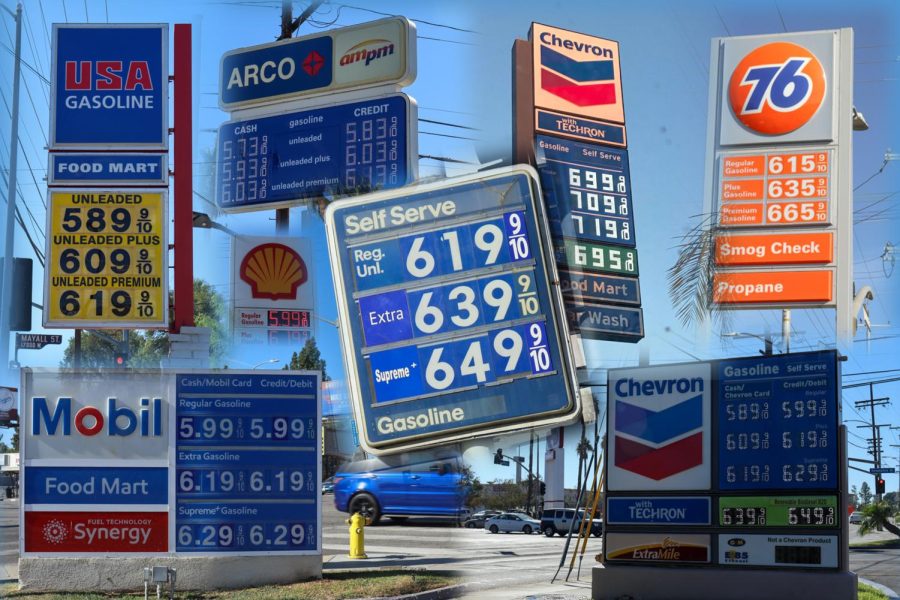OPINION: Gas inflation hurts college students
Photo Illustration
October 24, 2022
It has been no secret that gas prices in the Los Angeles area have been astronomically high. Prices have averaged around $6 per gallon, according to the Los Angeles Almanac. As of recently, I have seen two stations on the corner of Parthenia street and Balboa boulevard that are under $6. These prices have no doubt created enormous stress for many drivers, especially college students who commute to campus every day. It has proven to be just an added pressure on students who are already strapped for money.
Javad Sezgin, a geography major, describes his struggle with gas prices as stressful.
“Last week I paid $83 to fill my tank,” Sezgin said.
Sezgin added that even though he lives close to campus, it still adds financial stress. On top of that, he has to pay for parking.
“For a whole year I paid over $400,” Sezgin said. “At my community college it was a lot cheaper. It was like 50 bucks a semester.”
Sezgin still feels lucky though, as he knows other people who drive many miles just to get to campus.
Students are really feeling the impact of the expensive prices. It is much harder for students who cannot live close to campus since the surrounding area prices are also very steep. Many of them are forced to the alternative of living at home faraway and driving to campus.
“I know some people that drive about 50 miles to campus,” said Sezgin. “A couple of them have 8 a.m. classes so they have to wake up super early and then drive home right after their class.”
Brooke Bauman, a television production major, said that gas is so pricey that she often goes to Costco since gas there is cheaper.
“It’s about $4.90 [a gallon],” Bauman said. “It’s a lot less, but still expensive for gas.”
Bauman mentioned that she also tries to limit her driving when she can, due to the influx of gas prices.
This issue is largely due to the state of California having a lot of its oil refineries shut down, according to Forbes. As of Oct. 20, 2022, California is ranked as having the country’s highest gas prices with an average of $5.88 per gallon of regular gas, Forbes found. California’s neighboring state of Nevada has an average gas price of $5.11 per gallon. The average price per gallon in Washington is $5.26, while Texas’ is an inexpensive $3.30.
Recently, California Gov. Gavin Newsom and lawmakers came up with a plan for a gas rebate, according to CalMatters. This rebate would essentially reimburse taxpayers anywhere from $200 to $1050. This unfortunately may not begin until January 2023. Although a good start, this support will only provide minimal relief to gas users.
A lot of people have argued about what can be done about this problem. For starters, President Joe Biden had created a federal gas tax holiday. This holiday created a short-term break of not taxing gas for three months. However, this holiday seemingly backfired as it caught up within the last year as the break ended, and all the taxes added up again. As energy uses have gone up, so have oil prices.
The World Resources Institute mentioned four possible ways of combating these sky-high prices. They recommend better and lower-cost public transportation, expanding the pre-tax benefits into sustainable transport accounts, improving electric vehicles and working from home.
Of course, this is a little different for struggling college students who attend in-person classes and have jobs that require them to physically go to the workplace. In cases like these, some hacks students can use are carpooling, public transportation, biking, walking to campus or work if possible, and only driving when necessary. Also, looking for stations that have gas at a cheaper price.
CSUN also offers emergency grant money for those who qualify, which includes transportation resources.
These small changes could make a huge difference for those continuing their education. With the help of resources from the state, as well as CSUN, more students may be better equipped to handle today’s gas costs. Students coming together to help one another and being self-sufficient is priceless, even if gas costs elsewhere are too much.
